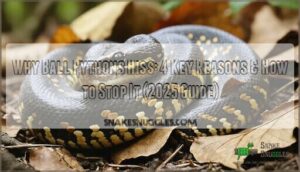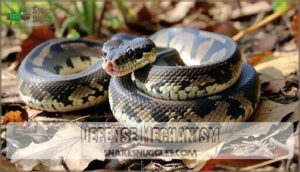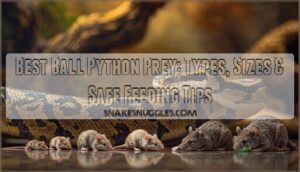This site is supported by our readers. We may earn a commission, at no cost to you, if you purchase through links.

This sharp breathing sound is their first warning before more dramatic defenses like striking or balling up.
You’ll hear it most when they’re startled, during handling sessions they’re not comfortable with, or when something in their environment feels wrong.
New pythons often hiss more until they settle in, while some naturally shy personalities might be more vocal than others.
Don’t take it personally – it’s just snake talk for "I need some space right now."
The good news? There are proven ways to help your python feel more secure and reduce this defensive behavior, which is essentially their way of saying "back off, please" or needing space, and by understanding this, you can better approach the situation to minimize stress and maximize trust, ultimately leading to a more comfortable environment for your python.
Table Of Contents
- Key Takeaways
- Why Ball Pythons Hiss?
- Reasons for Ball Python Hissing
- Frequency and Variability of Hissing
- Hissing in Baby Ball Pythons
- Hissing at Owners
- Strategies to Stop Hissing
- Understanding Hissing and Other Behaviors
- Seeking Professional Advice
- Frequently Asked Questions (FAQs)
- How can I get my ball python to stop hissing?
- Why is my ball python wheezing or hissing?
- Why did my ball python strike me?
- Do snakes hiss before striking?
- Can ball pythons learn to recognize their owners voice?
- Does a ball pythons hiss vary in pitch or volume?
- How does humidity affect a ball pythons hissing behavior?
- Can hissing indicate positive emotions in ball pythons?
- Do ball pythons hiss more during certain seasons?
- Can ball pythons hiss while sleeping or resting?
- Conclusion
Key Takeaways
- Your ball python’s hissing is communication, not aggression – It’s their natural way of saying "I need space" when they feel threatened, stressed, or uncomfortable, so don’t take it personally.
- Environmental factors trigger most hissing episodes – Improper temperature (should be 80-90°F), humidity issues, sudden movements, or inadequate hiding spots cause your snake to feel defensive and vocalize.
- Slow, gentle handling builds trust and reduces hissing – Move deliberately, support your python’s body fully, keep sessions brief initially, and avoid handling during shedding or after feeding to minimize stress.
- Persistent hissing with other symptoms needs veterinary attention – If your python hisses frequently alongside wheezing, loss of appetite, or lethargy, consult an exotic vet to rule out respiratory infections or health issues.
Why Ball Pythons Hiss?
When your ball python hisses, it’s basically saying "I need space right now." This defensive posture serves as their primary communication signal – a natural warning system that’s been hardwired into their survival instincts for millions of years.
When your snake hisses, it’s not being rude—it’s just using its ancient language to say "please give me some space.
Snake hissing reasons typically involve feeling threatened, stressed, or uncomfortable. Your pet isn’t being mean; they’re simply communicating through the tools evolution gave them.
Ball python behavior includes this vocalization as a non-violent way to establish boundaries. Environmental stressors like temperature changes, new surroundings, or sudden movements can trigger this response.
Sometimes health concerns like respiratory issues might also cause unusual hissing patterns in your snake.
Reasons for Ball Python Hissing
Your ball python’s hissing isn’t random behavior—it’s actually a clear form of communication that tells you exactly what they’re feeling.
Understanding these specific triggers helps you create a better environment for your snake and reduces unnecessary stress for both of you, which is essential for a healthy and happy relationship.
Defense Mechanism
When your ball python feels cornered, its hissing becomes a survival mechanism that’s been fine-tuned over millions of years.
Your snake’s hiss isn’t attitude—it’s ancient wisdom speaking through millions of years of survival instinct.
This instinctive response serves as their primary predator deterrent, creating an intimidating sound by forcing air through their glottis.
Your snake’s defensive behavior isn’t personal—it’s simply following nature’s playbook for staying alive.
It’s also a normal behavior, but excessive hissing can be concerning.
- Sharp, explosive hiss that startles potential threats
- Body coiled tightly like a loaded spring
- Head raised high in an S-shaped strike position
- Mouth slightly open revealing pale interior
- Eyes fixed intently on the perceived danger
Territorial Behavior
Territory matters when your ball python starts hissing.
Snake behavior involves defining territory through dominance displays and marking space around their enclosure.
Your snake might ball python hiss at perceived intruders or during resource guarding episodes.
This territoriality isn’t aggression—it’s communication.
Snake hissing signals "this is mine" rather than "I’ll attack you."
Ball python behavior includes coexistence strategies, so respect their boundaries.
Give them hiding spots and avoid rearranging their space frequently to reduce territorial stress.
Aggression and Fear
Although territorial behavior can prompt hissing, most defensive hissing stems from aggression or fear responses.
When your ball python feels threatened, it’ll create snake hissing sounds to appear more intimidating—think of it as puffing up like a scared cat.
This snake aggression doesn’t mean your pet hates you; it’s simply why snakes hiss as a survival instinct.
Understanding fear indicators like defensive posturing helps you recognize handling stress before it escalates.
Reading your snake temperament correctly reduces anxiety for both of you, making avoiding bites much easier through proper interpretation of these natural ball python hiss behaviors.
Frequency and Variability of Hissing
You’ll notice that hissing frequency varies substantially between individual ball pythons, with some snakes rarely making a sound while others hiss more regularly based on their unique personalities.
Several factors influence how often your snake hisses, including age, stress levels, environmental conditions, and their comfort with handling.
Individual Personality
Just like people, each ball python has its own temperament differences that shape how often it makes snake hissing sounds. Your snake’s unique quirks determine whether it’s naturally docile vs. defensive.
Some pythons rarely hiss, while others vocalize frequently based on their handling preferences. Understanding snake behavior means recognizing these personality changes over time.
Reptiles use diverse signals, and acoustic communication modes may influence hissing.
- Watch for your snake’s individual hissing patterns
- Notice how ball python behavior shifts with comfort levels
- Respect your pet’s snake communication style to ensure a harmonious relationship, considering their unique personality changes.
Factors Influencing Hissing
Several key elements work together to determine when and why your ball python decides to make that unmistakable hissing sound. Environmental stimuli like sudden temperature changes, bright lights, or loud noises can trigger snake defensive behavior instantly.
Your handling techniques matter enormously – rushed movements or improper support often result in stressed ball python reactions. Health conditions including respiratory infections or pain amplify hissing frequency substantially.
Snakes may also hiss more frequently when experiencing shedding, due to the vulnerability it causes. Snake personality plays a major role too, with some individuals naturally more vocal than others.
Understanding these stress levels helps you identify snake hissing causes and create better conditions for your pet’s comfort and wellbeing.
Hissing in Baby Ball Pythons
Baby ball pythons hiss more frequently than adults because they’re naturally more defensive and feel threatened by new environments or handling.
You’ll notice your young snake’s hissing behavior decreases substantially as it becomes comfortable with you and its surroundings over time, which can be seen as a sign of it feeling less threatened.
Behavior When Threatened
When threatened, baby ball pythons turn into tiny defensive warriors.
Their hissing serves as the first line of defense, warning potential predators to back away.
Young snakes exhibit more frequent defensive snake behaviors than adults because they’re naturally more vulnerable and less experienced at threat assessment.
Their hissing is primarily a defensive mechanism.
Here’s what triggers their fear response:
- Sudden movements that startle their sensitive nervous systems
- Unfamiliar scents or new environmental changes
- Direct eye contact which they interpret as predatory behavior
- Handling attempts when they’re already stressed or uncomfortable
These defensive postures and stress signals aren’t aggression—they’re survival instincts.
Changes With Comfort
Your baby ball python‘s hissing behavior transforms as comfort increases. Initially defensive hissing decreases when you provide proper Hiding Places and maintain Temperature Concerns between 80-90°F.
Humidity Balance at 60-75% reduces stress substantially. Smart Enclosure Adjustments like appropriate Substrate Selection help minimize snake discomfort.
Refusal to eat can also indicate stress. When your snake hissing meaning shifts from fear to curiosity, you’ll notice less defensive posturing.
A well-designed enclosure with secure spaces allows your ball python hiss frequency to naturally decline over time.
Hissing at Owners
When you approach your ball python’s enclosure and hear that familiar hiss, it’s usually a sign your snake feels threatened by your presence or sudden movements.
Your python isn’t being aggressive toward you personally – it’s simply using its natural defense mechanism to communicate stress, discomfort, or a need for space.
Reasons Behind Hissing
Your ball python’s hissing at you sends clear Defensive Signals about their comfort level. Understanding these Stress Indicators helps you respond appropriately to your snake’s communication needs.
When your ball python hiss becomes frequent, consider these Environmental Factors and Handling Issues:
- Sudden movements during interaction trigger defensive responses
- Incorrect temperature or humidity creates ongoing discomfort
- Health Concerns like respiratory infections cause increased vocalization
- Unfamiliar scents or recent enclosure changes stress your snake sounds meaning territory invasion
Addressing Fear and Discomfort
When your ball python shows fear and discomfort through hissing, Safe Handling becomes your best friend.
Start Gradual Socialization with brief, gentle sessions to build trust. Focus on Reducing Stressors like sudden movements or loud noises.
Enclosure Enrichment with proper hiding spots helps minimize snake stress. Watch for Health Concerns that might amplify discomfort.
Remember, patience wins the day when addressing snake handling issues and creating a calm environment.
Strategies to Stop Hissing
You can reduce your ball python’s hissing by creating a secure habitat with proper hiding spots and maintaining stable temperatures between 80-90°F.
Gentle handling techniques and slow movements will help build trust while giving your snake space during stressful times like shedding or after feeding, which can be a stressful time.
Providing a Secure Environment
Your ball python’s enclosure size matters more than you think.
Create a spacious habitat with multiple hiding spots – one on the warm side, one on the cool. Maintain a proper temperature gradient between 75-85°F and keep humidity levels around 50-60%.
Choose appropriate substrate choice that holds moisture without becoming soggy. A comfortable enclosure means less defensive behavior, and your ball python hiss episodes will become rare occurrences through effective stress reduction.
When your snake environment feels secure, snake stress decreases dramatically. Proper planning guarantees a suitable ball python habitat.
Calm Handling Techniques
Beyond creating a secure environment, your gentle approach during handling makes all the difference. Move with slow movements and support your snake’s body fully to prevent stress. This methodical technique helps build trust over time.
For added safety, some owners choose to use specialized protective gear.
Focus on these key principles:
- Reading cues – Watch for tension or defensive posturing
- Body support – Cradle your python’s weight evenly
- Stress reduction – Keep sessions brief initially.
Proper snake handling techniques transform your ball python’s behavior from defensive hissing to calm acceptance.
Understanding Hissing and Other Behaviors
When you learn to read your ball python’s hissing patterns, you’ll discover it’s actually a complex communication system that tells you exactly what your snake needs.
Understanding the difference between defensive hissing and stress-related sounds helps you respond appropriately and build a stronger bond with your pet.
Communication Through Hissing
When your ball python hiss echoes through the room, you’re hearing sophisticated communication complexity that goes beyond simple alarm calls.
These snake dialects carry nuanced messages about comfort levels, health status, and emotional states.
Interpreting signals requires attention to context – a post-feeding hiss differs from handling stress.
Hissing nuances include pitch variations and duration changes that reveal your pet’s needs.
Understanding snake behavior through this auditory range helps you respond appropriately.
Each ball python behavior tells a story when you learn their unique communication style.
Differentiating Threats
Your snake’s hissing isn’t random—it’s a sophisticated defense mechanism that responds to different threat levels.
Understanding snake behavior helps you recognize what triggers your ball python hiss and respond appropriately.
Key threat indicators to watch for:
- Predator Recognition: Your snake identifies you as a potential threat based on size and movement
- Environmental Cues: New sounds, smells, or lighting changes trigger defensive responses
- Handling Differences: Sudden movements versus slow, deliberate approaches produce different hissing intensities
Learned Associations also play a role—your python remembers past experiences and adjusts its Size Perception accordingly.
Snakes often hiss more when experiencing stress or fear.
Seeking Professional Advice
If your ball python’s hissing persists despite proper care or comes with other symptoms like wheezing or loss of appetite, you’ll need to consult an exotic veterinarian.
A reptile specialist can rule out respiratory infections and provide expert guidance on behavioral issues that home remedies can’t address.
Consulting a Veterinarian
Sometimes understanding why your ball python hiss isn’t enough. Persistent hissing combined with other symptoms requires professional veterinary care.
Your vet can perform URI Diagnosis and Parasite Screening while addressing snake respiratory issues. They’ll evaluate Behavior Changes and check for Nutritional Deficiencies that might trigger excessive hissing.
Addressing your snake’s health needs might involve finding the right reptile vet products for their specific care.
| Warning Signs | Veterinary Services | Expected Outcomes |
|---|---|---|
| Wheezing sounds | Respiratory infections treatment | Reduced hissing episodes |
| Loss of appetite | Preventative Care plans | Improved snake health |
| Lethargy patterns | Snake veterinary care guidance | Better behavioral understanding |
Professional consultation guarantees your snake’s well-being and addresses health-related hissing causes effectively.
Expert Guidance on Behavior
When veterinary care isn’t enough, reptile behaviorists and experienced herpetologists offer specialized expertise in snake behavior and communication patterns.
These professionals excel at behavior interpretation and can teach you advanced handling techniques that reduce stress while building trust with your ball python.
Expert guidance typically includes:
- Environmental enrichment strategies customized to your snake’s personality
- Stress reduction protocols based on scientific research
- Communication pattern analysis to decode your python’s hissing messages
- Long-term relationship building techniques for better coexistence
Frequently Asked Questions (FAQs)
How can I get my ball python to stop hissing?
You can reduce your ball python’s hissing by giving it space.
Moving slowly during handling, maintaining proper temperature and humidity, providing hiding spots.
And avoiding disturbance during shedding or after feeding.
Why is my ball python wheezing or hissing?
Your ball python’s wheezing might indicate an upper respiratory infection requiring veterinary care, while hissing typically signals stress, discomfort, or feeling threatened. Check tank conditions and observe for other symptoms.
Why did my ball python strike me?
Your ball python struck because it felt threatened or defensive.
Fear, stress, sudden movements, or feeling cornered can trigger strikes.
It’s their natural defense mechanism when they can’t escape or hide from perceived danger.
Do snakes hiss before striking?
Actions speak louder than words, but with snakes, hissing often comes first.
Yes, snakes typically hiss before striking—it’s their warning system.
You’ll hear that defensive sound as they prepare to defend themselves if threatened.
Can ball pythons learn to recognize their owners voice?
While ball pythons can’t truly recognize your voice like dogs do, they’ll respond to vibrations and your familiar scent.
They might seem calmer around you, but it’s more about recognizing your presence than actually hearing you.
Does a ball pythons hiss vary in pitch or volume?
Hissing intensity varies, hissing volume changes, hissing pitch shifts—your ball python’s warning calls aren’t one-size-fits-all.
You’ll hear louder, sharper hisses when they’re really stressed versus softer ones during mild annoyance.
How does humidity affect a ball pythons hissing behavior?
Improper humidity levels stress your ball python, triggering defensive hissing.
Too dry conditions cause shedding discomfort, while excessive moisture creates respiratory issues.
Maintain 60-75% humidity to keep your snake calm and reduce stress-related hissing behaviors.
Can hissing indicate positive emotions in ball pythons?
Like a telegraph operator sending urgent messages, your snake’s hiss rarely signals joy.
Ball pythons don’t express positive emotions through hissing. Instead, they hiss when stressed, threatened, or uncomfortable.
Happy snakes stay quiet and relaxed. Ball pythons don’t express positive emotions through hissing.
Do ball pythons hiss more during certain seasons?
Ball pythons don’t typically hiss more during specific seasons. You’ll notice increased hissing during shedding cycles, which can happen year-round in captivity, or when they’re stressed from environmental changes.
Can ball pythons hiss while sleeping or resting?
Your snake typically won’t hiss while truly sleeping since they’re relaxed and unaware.
However, if you startle them awake or they’re just lightly resting, they might hiss as a defensive response.
Conclusion
Understanding your snake is like learning a foreign language – their hissing tells you exactly what they need.
Now you know why ball pythons hiss and can address the root causes rather than just the symptom.
With proper handling techniques, a secure habitat, and patience, you’ll build trust with your python.
Remember that hissing isn’t aggression – it’s communication. Give your snake time to adjust, maintain consistent routines, and soon you’ll have a calmer, more confident companion.
- https://vetmed.tamu.edu/news/pet-talk/reptile-emotions/
- https://animals.mom.com/long-wait-after-feed-snake-move-him-11570.html
- https://www.thesprucepets.com/reasons-why-snakes-hiss-5215794
- https://ball-pythons.net/forums/showthread.php?57803-My-ball-python-is-hissing-at-me!
- https://www.justanswer.com/pet-reptile/n7xh1-ball-python-hissed-nothing-earlier-not-leaving.html
















